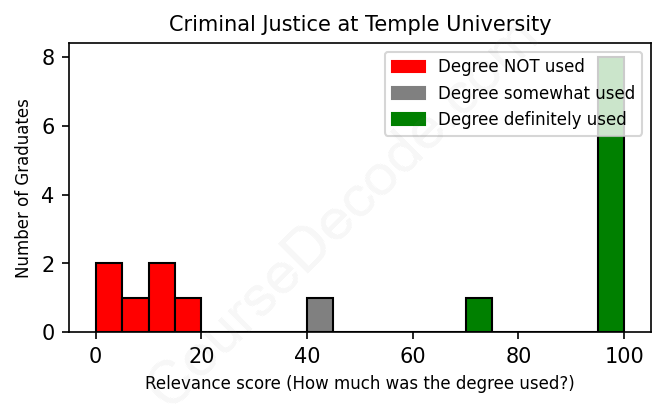
First, some facts. Of the Criminal Justice graduates from Temple University we've analyzed , here's how many have used (or NOT used) their degree in their career:

These are estimates based on AI analysis of 16 LinkedIn profiles (see below).
The verdict? Below average. Overall, with an average relevance score of 60%, Criminal Justice graduates from Temple University have a lower likelihood (-7%) of finding work in this field compared to the average graduate across all fields:
And for comparison, here's the chart for all profiles we've looked at across all degrees.
Also, after graduating, 43% of these graduates have pursued further education other than another Bachelor's degree (such as a Masters degree or other), compared to the average across all profiles of 35%. This suggests you may need more than just a Bachelors degree to be competitive as a Criminal Justice graduate.
See the details:
|
Relevance score: 0% We think this person has NOT gone into a career related to their degree. We think this person has NOT gone into a career related to their degree.
DEGREE INFOGraduated in 2023 from Temple University with a Bachelor of Arts - BA in Criminal Justice. Also pursued further education since (see below). JOB HISTORY SINCE GRADUATIONInsurance Associate USLI Jun 2023 - Dec 2023 Associate Surplus Lines Tax Filing Specialist  USLI Dec 2023 - Present FURTHER DEGREES DONE SINCE GRADUATINGMaster of Arts - MATemple University College of Liberal Arts 2023 - 2026 ABOUTI am a highly motivated and dedicated student with a strong background in the hospitality industry. My experience includes expertise in food & beverage, computer literacy, paperwork management, and hostessing, along with excellent phone skills. I recently graduated Summa Cum Laude from Temple University with a degree in Criminal Justice and a minor in Public Health. Currently pursuing a Masters degree in Criminal Justice from Temple University beginning in the Fall, expected to graduate in the Spring of 2026.Throughout my academic journey, I have consistently demonstrated a commitment to excellence, maintaining a 4.0 GPA and earning recognition on the Dean's List multiple times. Additionally, I have been honored with the Temple University Criminal Justice Excellence Award for my outstanding performance as a senior in my undergraduate year.In addition to my academic pursuits, I have a passion for the arts, particularly ceramics and other 3D mediums. This interest allows me to explore my creativity and provides a well-rounded perspective outside the classroom.I am eager to leverage my strong operational background, critical thinking skills, and dedication to make a meaningful contribution to the field of Criminal Justice. I am currently in the role of an Insurance Associate at USLI. |
The top 10 most common jobs done by the graduates we've analyzed (ranked most common to least) are:
Many graduates from Temple University's Criminal Justice program have found jobs closely related to their field of study, especially in roles like Juvenile Program Supervisor or Juvenile Probation Officer. These positions are a perfect fit, involving direct application of criminal justice principles with responsibilities that focus on juvenile offenders, legal processes, or rehabilitation. It's clear that those who pursued internships in legal settings, like the Philadelphia District Attorney's Office or the Pennsylvania Innocence Project, greatly benefited from their experiences, as these roles directly tie into their education and build relevant skills for their careers.
However, not all graduates ended up in jobs that leveraged their criminal justice degrees. Many pursued roles in fields completely unrelated to criminal justice, such as customer service, banking, or IT. These positions tend not to require the specialized knowledge gained from their degrees. Even roles that seem adjacent, like project assistants or case managers, often do not directly utilize core criminal justice skills. Overall, while some graduates successfully transitioned into relevant careers, a significant number veered off into unrelated fields, indicating a mixed bag of outcomes when it comes to job relevance for Criminal Justice graduates from Temple University.
Here is a visual representation of the most common words in job titles for Criminal Justice graduates (this is across all Criminal Justice graduates we've analyzed, not just those who went to Temple University):

Graduates from Temple University’s Criminal Justice program seem to have a pretty varied set of career paths, which is kind of interesting! For many of them, their first jobs after graduation tend to be in roles that are somewhat related to their field of study, like juvenile probation or case management positions. If you look at the early careers, quite a few people jumped into internships or entry-level roles that allowed them to gain some hands-on experience, often working directly with youth in the justice system or with organizations focused on social services. This makes sense given the nature of a Criminal Justice degree, as a lot of folks want to kickstart their careers helping others or working to make the justice process better.
Fast forward five to ten years, and you start to see a mix of outcomes. Some graduates have moved up within their initial fields and landed roles with more responsibility, such as coordinators or managers in various organizations. On the flip side, there are a few who seem to have drifted away from jobs specifically tied to criminal justice, finding themselves in positions that might be more business or customer service-oriented, like banking or marketing. It looks like there’s potential for growth and solid careers for some, especially those who stayed connected to the field, but others might find themselves in unrelated sectors. Overall, while many appear to have good starts in meaningful careers, not everyone remains directly within the criminal justice realm after a few years, which is something worth considering if you're eyeing this degree for yourself!
Honestly, getting a Bachelor’s degree in Criminal Justice at Temple University isn’t super easy, but it’s not the hardest degree out there either. It’s kind of like a solid mix—you’ll dive into some pretty interesting topics about the legal system, criminology, and social justice, but it can also get pretty detailed and require a lot of reading and writing. If you stay organized and keep up with your assignments, you should be able to handle it just fine. So, if you're genuinely interested in the subject, you might find it engaging and manageable, but if you’re just looking to coast through, it might be a bit of a challenge!
Most commonly, in the LinkedIn profiles we've looked at, it takes people 4 years to finish a Bachelor degree in Criminal Justice.
When you look at these Temple University Criminal Justice grads, it seems like they’re starting off in jobs that might not make them bank right away. A lot of them have roles like coordinators, case managers, or assistants, which usually offer decent pay but are still pretty entry-level, especially at the beginning of their careers. The ones further along, especially those in supervisory or director roles, are likely earning more, but it's a gradual climb. Overall, it looks like they’re on a steady path, but it might take some time before they hit those higher salary marks that you often see in more lucrative fields. So, while they're doing okay now, they might not be rolling in the dough just yet!
Here is a visual representation of the most common words seen in the "about" section of LinkedIn profiles who have a Bachelor degree in Criminal Justice (this is across all Criminal Justice graduates we've analyzed, not just those who went to Temple University). This may or may not be useful:

Here are all colleges offering a Bachelor degree in Criminal Justice (ordered by the average relevance score of their Criminal Justice graduates, best to worst) where we have analyzed at least 10 of their graduates: